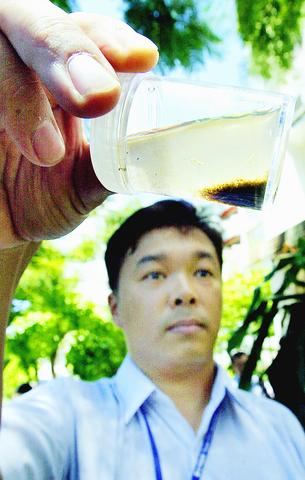The number of this year's dengue fever cases can be kept down to approximately 1,500 to 2,000, according to the head of the Department of Health yesterday.
At a press conference yesterday, Lee Ming-liang (李明亮) said that although this year's outbreak of dengue fever has been the most serious in 14 years, the number of cases would not exceed 2,000.
"We estimate that this year's dengue fever cases can be controlled to a number between 1,500 to 2,000 because the outbreak in Kaohsiung City has been brought under control and cleaning efforts have been launched by health bureaus in epidemic areas," Lee said.

PHOTO: CHEN CHENG-CHANG, TAIPEI TIMES
"I believe that the [positive] results of our effort [in controlling the disease] this week will be seen in the following week," he said, explaining that it would take at least a week to see the results of the cleaning effort since the incubation period for dengue fever is between three and 14 days.
According to the Center for Disease Control (CDC), this year's outbreak, which has been concentrated in Kaohsiung City and County, is the most serious in 14 years.
As of yesterday afternoon, the CDC had confirmed 1,024 cases of dengue fever. There are 500 in Kaohsiung City, 499 in Kaohsiung County, 12 in Pingtung County, two in Taipei City and Hualien County; and one each in Tainan County, Tainan City, Chiayi County, Taichung City, Taichung County, Taoyuan County, Hsinchu County, Taipei County and Penghu County.

PHOTO: LIN CHENG-KUNG, TAIPEI TIMES
Of the reported cases, seven in Kaohsiung City and eight in Kaohisung County have been confirmed as dengue hemorrhagic fever, the most severe form of the disease.
In addition, the CDC also said that, except for two isolated cases -- one in Taipei City and one in Taipei County -- all the remaining 1,022 cases have been confirmed to have been contracted by people traveling in the Kaohsiung area.
Although the number of reported dengue fever cases in the Kaohsiung area has gradually fallen to under 10 every day, the number in Kaohsiung County is still on the rise, according to the CDC.
Lee urged local health bureaus to strictly enforce penalties when carrying out inspections on people's households and public areas for possible mosquito breeding grounds, saying that it is not enough to rely on local health bureaus to spread disinfectants to control the disease.
"Dengue fever is an epidemic and a matter concerning public health. Failing to clean out mosquito breeding grounds endangers public safety," Lee said.
According to the Epidemic Prevention Law, anyone failing to clean up their household to eliminate possible mosquito-breeding areas could face fines up to NT$150,000. People who refuse to cooperate with local health bureaus or hinder public clean-up efforts could be fined up to NT$300,000
Dengue fever, a viral infection common in tropical and subtropical regions, is spread by bites from the Aedes aegypti or Aedes albopictus mosquito.
Aside from continuing with its disinfectant spraying program, the Kaohsiung County Government, noting schools are about to start the fall session near the end of this month, also asked all schools yesterday to carry out an all-out, campus clean-up.
The county government also asked schools to demonstrate to students how to destroy mosquito breeding areas, so that students can do the same while at home.
In addition, Taipei City's Bureau of Environmental Protection yesterday dispatched roughly 200 inspectors around town to carry out inspections to ensure that mosquito breeding areas have been cleaned out.
Those found to have failed to clean up mosquito breeding areas such as empty tires, artificial ponds, flower pots, water buckets, vases and water jars where stagnant water is held face fines of up to NT$6,000 as a first warning.
Within one week, inspectors from the Bureau of Health will revisit those who have been fined to double-check whether they have indeed cleaned up their mosquito-breeding areas, said the bureau's director, Chiu Shu-shih (
"If then they are found to still have mosquito breeding areas in their residential areas," Chiu said, "they will be facing fines for violation of the Epidemic Prevention Law."

The Central Election Commission has amended election and recall regulations to require elected office candidates to provide proof that they have no Chinese citizenship, a Cabinet report said. The commission on Oct. 29 last year revised the Measures for the Permission of Family-based Residence, Long-term Residence and Settlement of People from the Mainland Area in the Taiwan Area (大陸地區人民在台灣地區依親居留長期居留或定居許可辦法), the Executive Yuan said in a report it submitted to the legislature for review. The revision requires Chinese citizens applying for permanent residency to submit notarial documents showing that they have lost their Chinese household record and have renounced — or have never

A magnitude 5.6 earthquake struck off the coast of Yilan County at 12:37pm today, with clear shaking felt across much of northern Taiwan. There were no immediate reports of damage. The epicenter of the quake was 16.9km east-southeast of Yilan County Hall offshore at a depth of 66.8km, Central Weather Administration (CWA) data showed. The maximum intensity registered at a 4 in Yilan County’s Nanao Township (南澳) on Taiwan’s seven-tier scale. Other parts of Yilan, as well as certain areas of Hualien County, Taipei, New Taipei City, Taoyuan, Hsinchu County, Taichung and Miaoli County, recorded intensities of 3. Residents of Yilan County and Taipei received

Taiwan has secured another breakthrough in fruit exports, with jujubes, dragon fruit and lychees approved for shipment to the EU, the Ministry of Agriculture said yesterday. The Animal and Plant Health Inspection Agency on Thursday received formal notification of the approval from the EU, the ministry said, adding that the decision was expected to expand Taiwanese fruit producers’ access to high-end European markets. Taiwan exported 126 tonnes of lychees last year, valued at US$1.48 million, with Japan accounting for 102 tonnes. Other export destinations included New Zealand, Hong Kong, the US and Australia, ministry data showed. Jujube exports totaled 103 tonnes, valued at

BIG SPENDERS: Foreign investors bought the most Taiwan equities since 2005, signaling confidence that an AI boom would continue to benefit chipmakers Taiwan Semiconductor Manufacturing Co’s (TSMC, 台積電) market capitalization swelled to US$2 trillion for the first time following a 4.25 percent rally in its American depositary receipts (ADR) overnight, putting the world’s biggest contract chipmaker sixth on the list of the world’s biggest companies by market capitalization, just behind Amazon.com Inc. The site CompaniesMarketcap.com ranked TSMC ahead of Saudi Aramco and Meta Platforms Inc. The Taiwanese company’s ADRs on Tuesday surged to US$385.75 on the New York Stock Exchange, as strong demand for artificial intelligence (AI) applications led to chip supply constraints and boost revenue growth to record-breaking levels. Each TSMC ADR represents